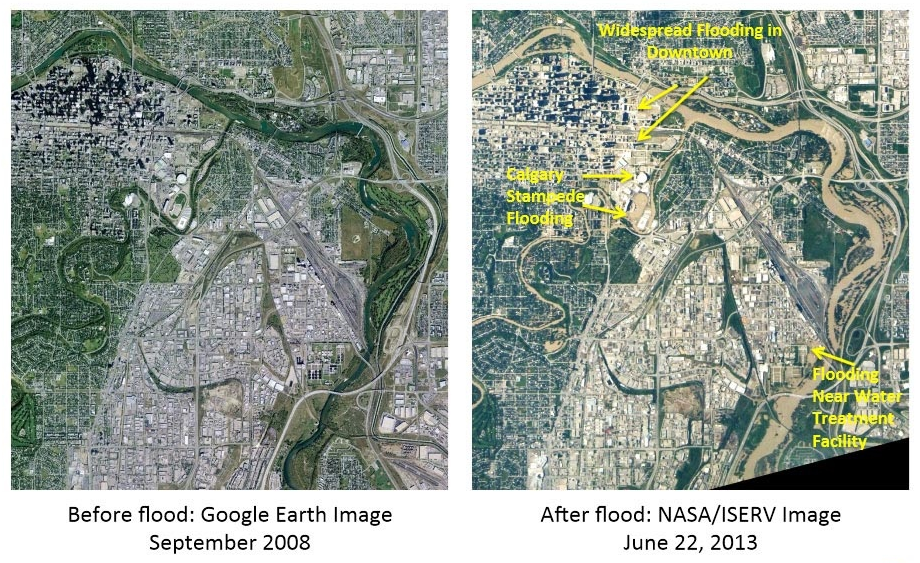After last night’s torrential downpour in Toronto and last month’s flooding in Alberta, climate change deniers in Canada must be having trouble making their usual arguments. There has been an increase in unusual weather this past decade, which the World Meteorological Organization recently called “the warmest decade since record-keeping began.” On average, Canada gets 20 days more of rain now than it did in the 1950s. Before 1990, only three Canadian disasters surpassed $500 million in damages–but in the past decade alone, there were nine.
Last night, Toronto received over 90 mm of rain; the average monthly average is 74.4 mm. Toronto Hydro reported that 300,000 people were without power at one point, including up to 80% of Mississauga residents. Drivers were stranded in their cars, which were left abandoned as rain waters overtook them, and passengers on a GO train to Richmond Hill had to be rescued by marine units after it was overcome with water. Some subway stations flooded, and power and signal problems caused major delays. Even the stalwart Toronto Island ferry was disabled by power failures.
On June 20th, many Alberta cities experienced severe flooding, including Calgary, High River, Okotoks, Canmore, Lethridge, Medicine Hat and Crowsnest Pass. 100,000 people in Calgary were evacuated from their homes, including those living downtown, as the Elbow and Bow Rivers overflowed. Dramatic photos from the event show the entire city submerged under flood waters.

Calgary Transit has posted photos of the damage to rail tracks, bridges and trains being towed down the street after flood waters receded. The city wasn’t safe either…a mere two weeks later, another flash flood hit the city. City officials say it will cost at least $256 million to repair damages, including $25.6 million to repair historic city hall, $50 million for the Calgary Zoo and $11.7 million to repair Calgary Transit facilities. Some estimates go as high as $1 billion total. Across Alberta, the total will rise to $3 to 5 billion and the provincial government has already pledged $1 billion. Some fault lies in poor planning, as this Vancouver Sun article describes (“Disaster recognition lost in the floods”, July 8, 2013):
Three major floods occurred during the period of 1875 to 1902, and early Calgary residents were well aware of the flood danger. Between 1932 and 2005, however, there was not a single major flood in the city, perhaps lulling people into a false sense of security. During that period and more recently, thousands of homes were built on floodplains within the city limits. –Dr. John Clague, Director of the Centre for Disaster Research, SFU
Some Canadian cities have actively sought climate change adaptation, but federally there isn’t much momentum yet for strategies like flood control as there was in previous decades–the Flood Damage Protection Program ran from 1975 to 1990, inhibiting development in low-lying areas. Dr. Clague reports that in Calgary, residents opposed the designation of flood-prone land urged in several City of Calgary reports, as they didn’t believe a flood risk existed and thought the designation would decrease their property values. This year’s flood was preceded by an earlier one in 2005.
Economic, ecological, and community resilience have risen to prominence among urban thinkers, politicians, and planners in the past few years, perhaps due to these increasingly unstable weather and unusual climate events. Today, Mary Rowe of the Municipal Art Society of New York City will be at the Canadian Institute of Planners conference in Vancouver as part of a debate on climate change adaptation and the responsibility of planners to relocate people to less hazardous areas. Other participants will be Jack Basey (BC planner), David Brown, (McGill University planner professor), Christine Platt (Commonwealth Association of Planners), and moderator Mark Seasons (University of Waterloo planning professor). Mary works on environmental sustainability and resilience, and spent five years as coordinator of the New Orleans Institute for Resilience and Innovation working on post-Katrina community recovery. She will also speak tonight on community-based resilience: http://communityresilience.
